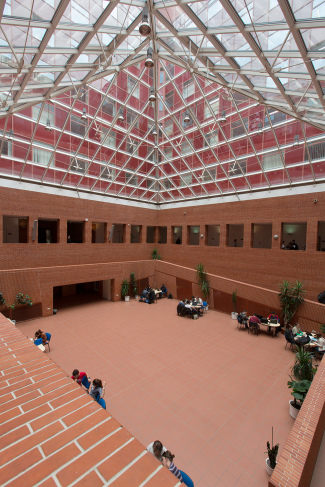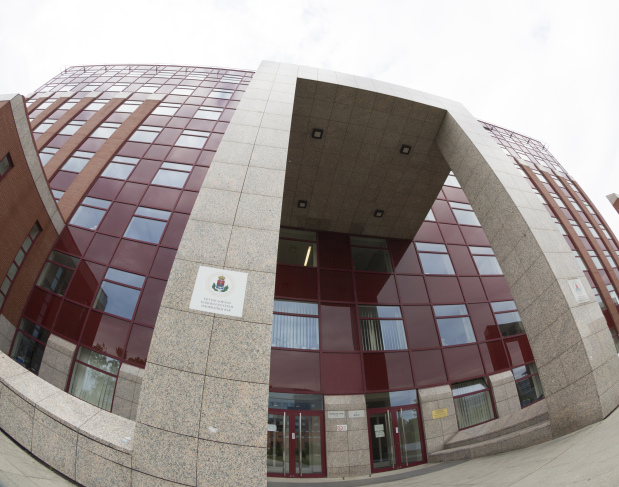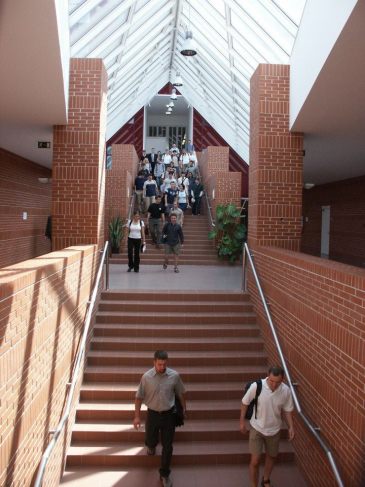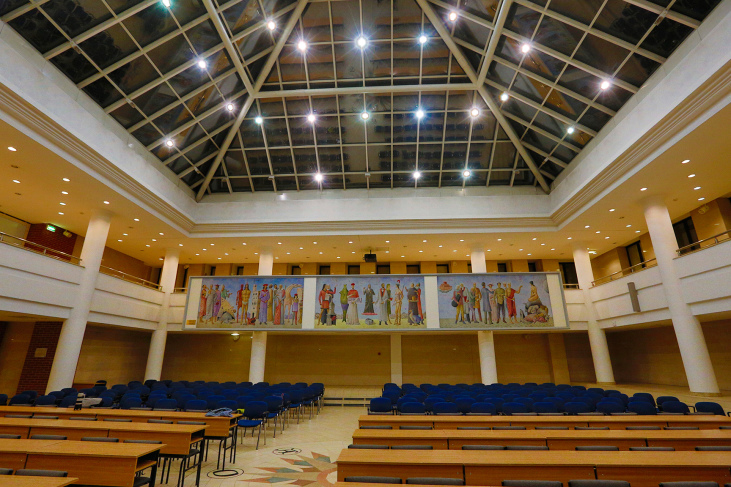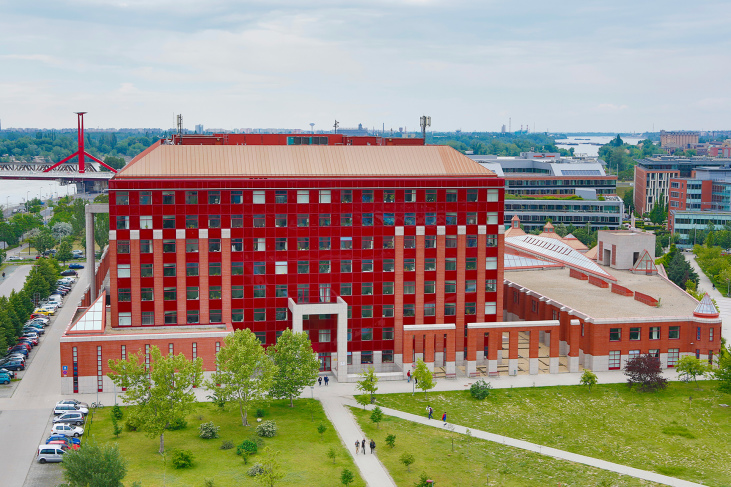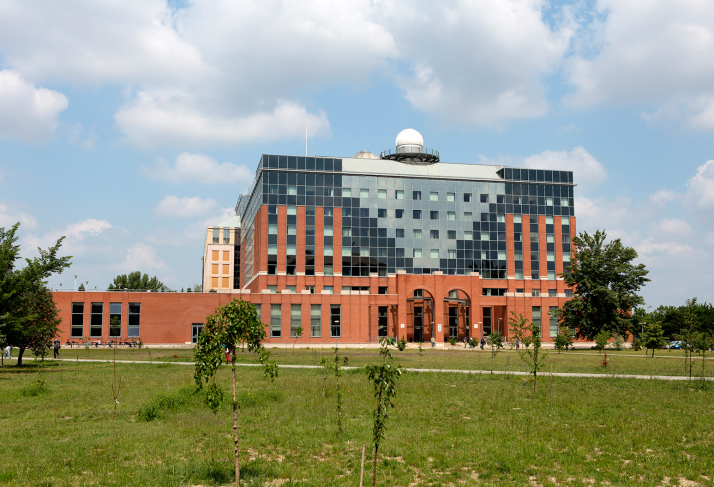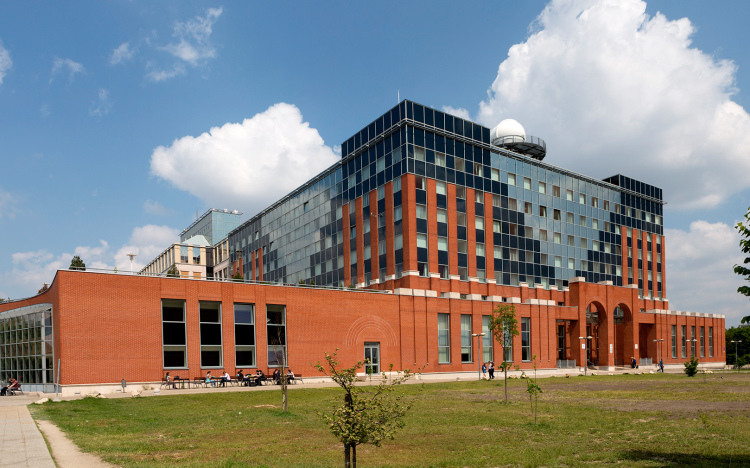International Relations MA

Georgia
International Relations MA
International relations expert
Degree program
Master
FNYF/61-1/2019
English
4 semesters (2 years)
120
10
40
The goal of this programme is to offer students in-depth knowledge on the topics of globalization, international institutions, security, development studies, and human rights. It enables our graduate students to understand and analyse complex political and social problems that go beyond state borders and cultural boundaries.
This programme is recommended to applicants who are interested in politics, social problems and interactions between different nations and cultures. While preference is given to students with prior knowledge in political science or international relations, students with a different background will complete foundational courses in our BA programme in the first semester in order to acquire the necessary knowledge.
This programme enables students to work independently and also as members of a team. We help them to develop skills of adaptability and self-reflexivity that are crucial in today’s fast changing World. Our aim is to give our students skills and knowledge that could be readily used whether they seek employment in the public or private sphere.
Tracks/ Specializations
Following an introductory semester on advanced classes of international relations and political science in the second semester, students can choose from one of the following specializations:
- European development and foreign policy
- Human Rights
- Security Studies
The MA in International Relations offers intensive training in four fields of specialization following an introductory semester. Classes are predominantly seminars of few students taking part in an intensive training of completing numerous written and oral assignments. Instructors in the programme include academics, but also professionals with ongoing experience at international organizations to offer students an internal perspective into how IR is ‘done in the field’.
Our graduates may seek employment at international institutions, in the private sector, media or at NGO’s.
- Foreign Policy Analyst
- Lobbyist
- Project coordinator (public/private/non-profit)
- Political Advisor
- Administrative jobs in the state bureaucracy and at private enterprises
1550 EUR
3500 EUR
EUR 50 (non-refundable) between 01/10/2024-15/11/2024________________ EUR 100 (non-refundable) between 20/11/2024-30/04/2025________________ EUR 180 (non-refundable) between 05/05/2024-31/05/2025
EUR 50 (non-refundable) between 01/10/2024-15/11/2024________________ EUR 100 (non-refundable) between 20/11/2024-30/04/2025________________ EUR 180 (non-refundable) between 05/05/2024-31/05/2025
3500 EUR
EUR 50 (non-refundable) between 01/10/2024-15/11/2024________________ EUR 100 (non-refundable) between 20/11/2024-30/04/2025________________ EUR 180 (non-refundable) between 05/05/2024-31/05/2025
YES
01, Sep, 2025
31, May, 2025
No
Entry requirements:
Undergraduate / Bachelor diploma (or higher)
Applicants must have a BA/BBA degree in any of the following fields: International Relations, Social Sciences, Humanities, Economics, Law. In case of other bachelor's degrees: individual consideration.
If the BA degree does not meet all the necessary requirements, the applicant may be required to complete additional credits in the relevant fields during their first year of study to fulfil these requirements upon acceptance.
Language requirements:
Certification of English knowledge (both written and oral): B2
IELTS Score: 5.5
TOEFL IBT Band: 46-59
Cambridge English Scale Score: 162
If the applicant does not have any of the above certifications, their English proficiency will be assessed during the admission interview. Any letter of acceptance issued by the Faculty of Social Sciences is based on the verified fact that the applicant’s command of English has been assessed; therefore, they are considered eligible to pursue their studies at the institution.
If the applicant can prove that they completed their former education entirely in English by submitting a notarized attestation and a detailed academic transcript, no proof of language knowledge will be required throughout the admission process.
| Document | Comment |
| Application form | - |
| Bachelor-level degree | |
| Transcript of records | |
| Motivation letter | The general guidelines and expectations for the letter are: the applicants introducing themselves, their motivation, interests and goals with the programme. The length of the motivation letter is between 1500 and 4000 characters. |
| Letter of recommendation | 2 are required |
| Copy of the main pages of the passport | needs to be valid |
| Copy of application fee transfer | |
| Language certificate | If the applicant has one. |
The application starts in the online application system. Students need to register in the system, fill in the online application form, upload the required documents and follow the instructions during the application process.
Students who (also) hold Hungarian citizenship must apply through felvi.hu Please note that if an application is submitted not according to the aforementioned, it will be rejected.
Procedure of the entrance examination
The application deadline refers to the final submission of the complete application package through the online application system.
For the September intake, there are three application periods:
- Early Bird Period: October 1, 2023, to November 15, 2023, 23:59 (CET)
- Regular Period: October 16, 2023, to April 30, 2024, 23:59 (CET)
- Last Call Period: May 1, 2024, to May 31, 2024, 23:59 (CET)
These distinct periods allow applicants the flexibility to submit their applications at their convenience. All applicants within each period have an equal chance of gaining admission to the programme.
After each application deadline, the Admission Board reviews the applications. After the admission interview, applicants are informed of the selection outcome through the online application system within approximately one month. Admission letters are expected to be sent out through the online application system until the end of June. For February intake and Early Bird applications, admission letters are expected to be sent out through the online application system until the end of December.
Applicants with a full application package will be notified after the application deadline about the exact time and date of application interviews conducted via Ms Teams. Applicants are responsible for having technically suitable conditions for the interview from their side
Applicants are expected to be prepared taking questions regarding the compulsory admission materials (see: Recommended readings for the entrance exam) from the side of admission committee composed of a professor, a lecturer and a student representative.
Based on the results, certain students may be placed on a waiting list. Final results are expected by the first half of August.
Type of entrance examination: Oral
Place of entrance examination: Online
Further details of the entrance exam:
As the programme expects students with diverse backgrounds, the goal of an entrance exam is not to test what students know, but to see if they are motivated in the first place; if they have a good grasp of current global affairs; and if they possess the analytical skills necessary to join the programme.
Below is a list of suggested articles from Oxford Research Encyclopaedias (http://oxfordre.com/internationalstudies). We recommend these not because we expect students to know them by heart, but because we would like to offer applicants the opportunity to get a rough idea about what issues and topics the field of International Relations (IR) deals with.
Recommended Readings
Engstrom, P. (2017, December 22). Human Rights: Effectiveness of International and Regional Mechanisms. Oxford Research Encyclopedia of International Studies. http://oxfordre.com/internationalstudies/view/10.1093/acrefore/9780190846626.001.0001/acrefore-9780190846626-e-214
Foyle, D., & Van Belle, D. (2017, November 20). Domestic Politics and Foreign Policy Analysis: Public Opinion, Elections, Interest Groups, and the Media. Oxford Research Encyclopedia of International Studies. http://oxfordre.com/internationalstudies/view/10.1093/acrefore/9780190846626.001.0001/acrefore-9780190846626-e-9
Goodman, J. (2017, December 22). Nationalism as a Social Movement. Oxford Research Encyclopedia of International Studies. http://oxfordre.com/internationalstudies/view/10.1093/acrefore/9780190846626.001.0001/acrefore-9780190846626-e-267
Kiely, R. (2017, November 30). Dependency and World-Systems Perspectives on Development. Oxford Research Encyclopedia of International Studies. http://oxfordre.com/internationalstudies/view/10.1093/acrefore/9780190846626.001.0001/acrefore-9780190846626-e-142
Stempel, J. (2017, November 30). Diplomacy and Intelligence. Oxford Research Encyclopedia of International Studies. http://oxfordre.com/internationalstudies/view/10.1093/acrefore/9780190846626.001.0001/acrefore-9780190846626-e-151
Walt, S. (2017, December 22). Realism and Security. Oxford Research Encyclopedia of International Studies. http://oxfordre.com/internationalstudies/view/10.1093/acrefore/9780190846626.001.0001/acrefore-9780190846626-e-286
If you are unable to access the Oxford Research Encyclopaedia’s’ materials, the following readings are recommended for the entrance exam:
On Human Rights:
McGlinchey, S. (2022, March 27). Introducing Human Rights in International Relations. E-International Relations. https://www.e-ir.info/2022/03/27/human-rights-in-international-relations/
On Foreign Policy Analysis:
Alden, C., & Aran, A. (2011). Foreign Policy Analysis – An Overview. In Foreign Policy Analysis: New Approaches (pp. 1–14). Routledge. ISBN 9780203640999. https://openaccess.city.ac.uk/id/eprint/26175/8/Aran_Foreign%20Policy%20Analysis_New%20Approaches%20chapter.pdf
On Nationalism:
Vargas Maia, T. (2022, June 8). The ‘Erasure of Nationalism’ and International Relations. E-International Relations.https://www.e-ir.info/2022/06/08/the-erasure-of-nationalism-and-international-relations/
On Dependency Theory:
Hout, W. (2017). Classical Approaches to Development: Modernisation and Dependency. In J. Grugel & D. Hammett (Eds.), The Palgrave Handbook of International Development (pp. 21–39). Basingstoke: Palgrave Macmillan.
https://repub.eur.nl/pub/94356/Chapter-Palgrave-Handbook-of-Intl-Devt.pdf
On International Security:
Jester, N. (2022, April 12). International Security. E-International Relations.
https://www.e-ir.info/2022/04/12/international-security/
On Realism:
Antunes, S., & Camisão, I. (2018, February 27). Introducing Realism in International Relations Theory. E-International Relations.
https://www.e-ir.info/2018/02/27/introducing-realism-in-international-relations-theory/
On Intelligence:
Kupcikas, K. (2013, November 8). The Importance of Intelligence to International Security. E-International Relations.
https://www.e-ir.info/2013/11/08/importance-of-intelligence-to-international-security/
Further details of selection and evaluation
Applicants with a full application package will be asked to participate in an oral entrance exam. The institutional admission scores are based on a total evaluation of academic excellence (based on the submitted documents) and the results of the entrance exam. The entrance exam seeks to assess the general and professional knowledge and interest of the applicant.
A successful oral entrance exam is the prerequisite of getting admitted. If the applicant fails the oral entrance exam, the application will be rejected.
Dr. Zoltán Gábor SZŰCS
Vice-dean for International Affairs, Deputy Director of Institute
Ms Natália DVORNYICSENKÓ
Departmental Coordinator
E-mail: eutud@tatk.elte.hu
TEL: +36 1 372-2500/6856
Mr Benedek DÖRGŐ
Departmental Coordinator
E-mail: eutud@tatk.elte.hu
TEL: 0036 1 372-2500/ 6867(ext)
International Office, Faculty of Social Sciences
TEL: +36-1-372-2500/6779
E-mail: international@tatk.elte.hu
Postal address:, Pázmány Péter sétány 1/A, Budapest, H-1117
Faculty of Social Sciences
Faculty of Social Sciences
Eötvös Loránd University (ELTE) offers more than 60 degree programs in foreign languages in the fields of Education and Psychology, Humanities, Informatics, Law, Social Sciences and Science. Currently, about 2400 international students study at ELTE and the community of international students is growing from year to year. Check out what our international students think and discover the wide-range of opportunities waiting for you at ELTE. Join the growing international community of ELTE.
Eötvös Loránd University (ELTE) offers more than 60 degree programs in foreign languages in the fields of Education and Psychology, Humanities, Informatics, Law, Social Sciences and Science. Currently, about 2400 international students study at ELTE and the community of international students is growing from year to year. Check out what our international students think and discover the wide-range of opportunities waiting for you at ELTE. Join the growing international community of ELTE.
0
/
0


















0
/
0


